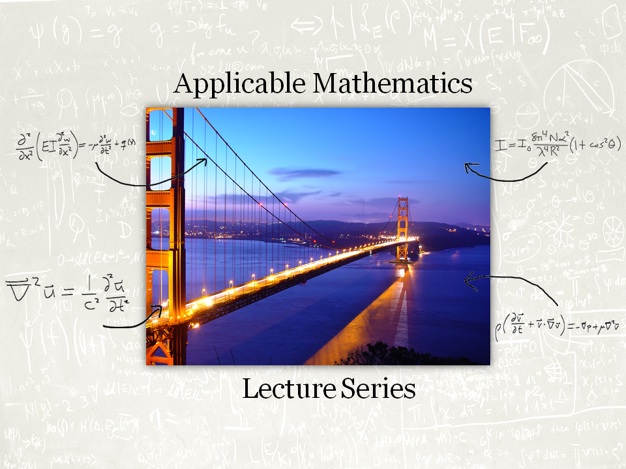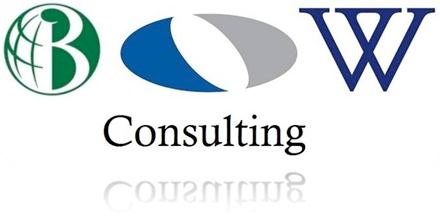Funded by the Mellon Three Colleges Presidential Innovation Fund


(Read about the equations below)
The Applicable Mathematics Lecture Series is a lecture series in Applicable Mathematics whose location rotates between Babson College, Olin College, and Wellesley College. Food will be provided at the lectures, so bring your appetite in addition to your curiosity!
Speaking of curiosity, you’ve probably noticed the four equations above pointing to different parts of the picture of the Golden Gate bridge. The equation in the upper left points to the bridge’s suspension cables, and is the Euler-Bernoulli beam equation. It describes the dynamics of a beam. The equation in the lower left points to the lights on the bridge, and is the Wave Equation. It describes the propagation of waves, like light. The equation in the upper right is the Rayleigh Scattering equation, and describes the scattering of light off of molecules (which helps explain the sky’s color). Finally, the equation in the lower right is the Navier-Stokes equation. It describes the mechanics of fluids like water.
Much like the image above, the aim of the lecture series to showcase the applications of mathematics, in addition to discussing the mathematics itself. Speakers are thus invited from both academia and industry to share with us the way they use mathematics in their professions.
Past Lectures
2014
-
1.Loren Shure, Mathworks
MATLAB, Calculus, and More
-
2.Mike Remolona, Mathematica
Mathematica 10 in Education and Research
2013
-
1.Shu Lin, The Chubb Corporation
Becoming An Actuary
2. Karen Chang, Bank of America
The Mathematics of Equity Derivatives
2012
1. Aaron Hoffman, Olin College
Phase Planes, Waves and Delays
2. Nathan Karst, Babson College
When “Catastrophic” Means “Not That Bad”
3. Andrew Shultz, Wellesley College
Linear Algebra in Your Daily (Digital) Life
4. Brian Storey, Olin College
Modeling Flow and Transport in Nanofluidic Devices
5. Ann Trenk, Wellesley College
The Discrepancy of a Poset: A Mathematical
Approach to Fair Rankings
On this page you’ll find information about three programs I have created at Wellesley that aim to give students extracurricular opportunities to interact with mathematics.
Brief descriptions of each program are to the right, followed by a more in-depth discussion of each program below.
-
1.The Applicable Mathematics Lecture series. The AMLS brings in speakers from both academia and industry to talk to students about how math is used in the workplace.
-
2.B.O.W. Consulting. Structured as an independent study course, I and other faculty supervise students from Babson College, Olin College, and Wellesley College as they work in collaboration with local companies on projects of mutual interest. The student teams effectively act as consulting teams, using their mathematics, economics, and computer science backgrounds to make recommendations to the companies that improve their operations.
-
3.Wellesley Emerging Scholars Initiative. Together with professor Stanley Chang (Wellesley College math department), I run the Wellesley Emerging Scholars Initiative (WESI). WESI is a learning community centered on excellence in mathematics for underrepresented students enrolled in our calculus courses. We meet with students twice weekly in one-hour workshops and have them work in teams to solve challenging calculus problems they wouldn’t normally see in their courses.
Applicable Mathematics Lecture Series


B.O.W. Consulting





B.O.W. Consulting (short for “Babson, Olin, Wellesley Consulting Group”) is a new, exciting program that provides a unique educational experience by introducing participants to the ways that advanced mathematics and statistics are used in the real world to analyze and solve complex problems.
As part of the program, students from Babson, Olin, and Wellesley work in teams on problems provided by local companies and/or non-profits. The student teams work closely with the organization's liaison to define the problem and develop solutions of immediate importance to the organization.
Faculty from two of the colleges, Nathan Karst (Babson) and Oscar Fernandez (Wellesley), supervised three teams working on three different projects, each described below.
Project 1: Pricing Models for Products in Development.
Boston Scientific, an S&P 500 component company that develops and manufactures a host of medical devices, must constantly determine how much it should charge its customers for the new products it develops. If the company charges too much for a product, it's sales will suffer. On the other hand, if it charges too little the revenue generated may not offset the product's cost to make, resulting in no profit. Therefore, for a given product Boston Scientific would like to determine the optimal price. Factors such as product demand, supply, cost, and positioning are among the several variables that will influence this analysis. The project liaison has stated that this project would be great for students interested in careers in business/applied statistics.
Project 2: Assessing Risk in Product Development and Testing.
Probability and statistics are used by companies like Boston Scientific to help them better understand their product development process. The company would like to identify potential opportunities to apply Bayesian probability to improve Boston Scientific procedures. An example of a possible practical implementation of this analysis, along with potential benefits and risks, is desired.
Project 1: Optimal Distribution of Solar-Powered Waste Compactors.
Projects:
You’ve likely run into BigBelly’s solar-powered waste compactors. These bins can hold more waste than traditional trash cans because they compact their contents using power from the solar panels on the bins. With bins scattered across different cities, what is the most efficient way to collect them? And since some cities produce more waste than others, how should the company distribute it bins across each region?
Funded by a Mellon Three Colleges Presidential Innovation grant
Wellesley Emerging Scholars Initiative


The goal of the Wellesley Emerging Scholars Initiative (WESI) is to recruit and retain underrepresented students into the math and science majors by creating a learning community centered on Calculus I/II/III (Math 115/116/205) in which students work through challenging problems to solidify and deepen their understanding of Calculus. The central features of WESI are:
•a problem-based approach to learning focused on high-level work rather than remediation
•a welcoming community with shared academic interests
•collaborative learning and small-group interactions
•an opportunity to develop mentoring relationships with faculty in the math department at Wellesley
•The opportunity to meet mathematicians working at local companies and tour their job sites
The WESI approach to learning requires a weekly commitment of 2 hours outside of class to attend the program’s workshops. Each workshop will be led by either Professor Oscar E. Fernandez or Professor Stanley Chang, and will use problem-based learning to expose students to challenging Calculus problems that require both content knowledge and critical thinking skills. By closely tracking the material covered in the participants' Math 115/116/205 classes, the problems of each workshop will present students with an opportunity to sharpen their understanding of the material.
The WESI initiative is an adaptation of the Emerging Scholar Program (ESP). The ESP model has been adopted by over one hundred campuses across the nation, and research has shown that ESP participants tend to earn higher grades than non-ESP participants. In addition, the ESP model positively impacts retention in a STEM-based major.
WESI is funded by a grant from the Mathematical Association of America and the Tensor Foundation.